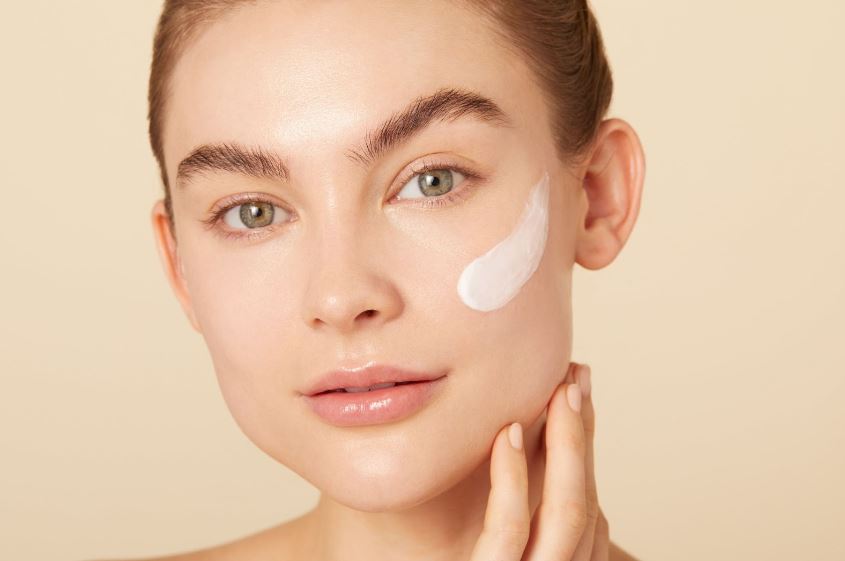Senté offers a variety of solutions that can help reduce inflammation in the face. Inflammation isn’t inherently a bad thing—it’s the body’s immune response to injuries, infections, allergens, and other environmental stressors. If you’re interested in skincare for inflammation, finding ways to minimize chronic inflammation should be your priority.
There’s a big difference between short-term and long-term inflammation. While short-term inflammation is simply a natural healing mechanism, long-lasting inflammation can be uncomfortable, and it causes lingering redness that can affect self-confidence. Additionally, long-term inflammation can cause skin cell damage, which may contribute to premature signs of aging.
Fortunately, there are plenty of highly effective ways to combat long-term inflammation. Here are 7 ingredients that have been clinically shown to help reduce inflammation in the face.
1. Niacinamide
Niacinamide (also known as nicotinamide) is a water-soluble form of vitamin B3. Niacinamide stimulates the production of protein, ceramides, lipids, and keratin, helping to rebuild and restore the skin’s outer barrier. A strong top layer of skin naturally helps you to retain moisture and reduce dehydration while simultaneously keeping inflammation-causing environmental stressors from penetrating into the deep layers of skin.
2. Antioxidants
Antioxidants are used to neutralize harmful free radicals—unstable molecules that cause skin cell damage, leading to inflammation, an uneven skin tone, and premature signs of aging. Antioxidants help reduce inflammation in the face by preventing the inflammation from occurring in the first place.
It’s impossible to avoid free radicals entirely, because they’re in air pollution, and they can also be caused by sun exposure and normal cellular functions. However, you can take steps to ensure that they don’t harm your skin. Once free radicals are neutralized, they’re no longer able to damage your skin cells and break down collagen, meaning your skin doesn’t need to become inflamed as a response.
3. Heparan Sulfate Analog (HSA)
Last but certainly not least, Heparan Sulfate Analog (HSA) is a revolutionary molecule that’s exclusive to Senté. It’s far-and-away one of the best options for those looking to help reduce inflammation in the face. Our patented HSA technology offers numerous benefits, including helping the skin to renew itself from within and soothe inflamed skin.
HSA delivers deep hydration, helps boost the skin's immune response to inflammation by reducing the signals sent by distressed skin cells, and activates growth factor signals that encourage the production of collagen and elastin. HSA doesn’t just help minimize inflammation—it targets the root cause of it. This breakthrough ingredient is backed by science and is highly recommended by more than 500 reputable dermatologists.
4. Peptides
Peptides are amino acids that are already found in your body. They’re used to build elastin, collagen, and other essential proteins that improve skin firmness and laxity. Like niacinamide, peptides strengthen the skin’s barrier to lock moisture in and keep environmental stressors out. In addition to helping prevent inflammatory materials from entering your skin, peptides are a great choice for those looking to improve the appearance of fine lines and wrinkles.
5. Vitamin E
Vitamin E is a nutrient that’s incredibly popular as an ingredient in skincare products and on its own, particularly as an emollient. Vitamin E absorbs easily into the skin, naturally soothing dry, chapped, rough, or cracked skin associated with inflammation. Additionally, vitamin E is a powerful antioxidant that neutralizes free radicals.
6. Caffeine
Caffeine is well-known for its stimulating properties, but you might be surprised to learn that it’s a highly-effective ingredient for skincare for inflammation. It’s packed with antioxidants and commonly used to help reduce inflammation in the face because of its anti-inflammatory properties, as well as its vasoconstrictive properties that constrict blood vessels, producing a tightening effect while reducing the appearance of redness, puffiness, and other signs of inflammation.
7. Sunscreen With Zinc Oxide
Zinc Oxide is a natural mineral that has been used to heal injuries, burns, and scars for thousands of years. It’s commonly found in anti-rash and anti-itch creams due to its soothing, anti-inflammatory properties, and we also incorporate it in our sunscreen formulas.
Zinc oxide is an excellent choice for those looking to both prevent and help reduce inflammation in the face that’s caused by prolonged exposure to the sun. It offers outstanding protection from ultraviolet rays, acting as a broad-spectrum shield between your skin and the sun’s UV rays. Additionally, zinc oxide acts as a barrier between your skin and the inflammation-causing visible blue light that emanates from smartphones, computers, and other electronic devices.
Using mineral sunscreen as part of your daily skincare for inflammation regimen is one of the easiest and most effective to keep facial redness at bay. After all, a sunburn is simply an inflammatory response to damaged skin cells. Our physical sunscreens can work wonders as a core part of your long-term routine to help reduce inflammation in the face, especially if you have sensitive skin.
Shop Medical-Grade Solutions
We have everything you need to develop a skincare for inflammation routine that works. For personalized guidance on how to help reduce inflammation in the face based on your unique needs and preferences, please take our skincare quiz or contact us to speak with an expert.
Check our skincare blog for more information on how to minimize inflammation, and shop even-toned, medical-grade solutions at Senté.
The views or external links featured on this blog represent the opinions of their respective contributors and may not necessarily reflect the position of Sente. All content is provided for informational/educational purposes and is based on personal experiences, observations, or research. While every effort is made to ensure accuracy, Sente makes no representations or warranties about the completeness, reliability, or accuracy of the information presented. The information and opinions shared on this blog do not constitute medical advice. Readers are encouraged to independently verify information and should consult a qualified healthcare professional for diagnosis and treatment of any medical condition.



